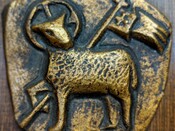 Trinity 22 Micah 6:6–8 November 17, 2019 St. John’s Lutheran Church—Chicago, IL In the name of + Jesus. The oracles of the prophet Micah are full of God’s judgments. For behold, the Lord is coming out of his place, and will come down and tread upon the high places of the earth. And the mountains will melt under him, and the valleys will split open, like wax before the fire, like waters poured down a steep place (Mic 1:3–4). And again, Woe to those who devise wickedness and work evil on their beds! When the morning dawns, they perform it, because it is in the power of their hand…They covet fields and seize them, and houses, and take them away; they oppress a man and his house, a man and his inheritance. Therefore thus says the Lord: behold, against this family I am devising disaster, from which you cannot remove your necks, and you shall not walk haughtily, for it will be a time of disaster (Mic 2:1–3). The cause of these judgments is not a momentary loss of ethics. He comes down upon the high places, which is to say, upon the altars and the places of false worship. Judea and Samaria alike draw God’s wrath because they turn to idols. False worship kindles God’s anger. But how shall we distinguish between false worship and worship in the spirit and in truth, as Jesus describes it to the Samaritan woman? It’s not an easy distinction to make: “With what shall I come before the Lord, and bow myself before God on high? Shall I come before him with burnt offerings, with calves a year old? Will the Lord be pleased with thousands of rams, with ten thousands of rivers of oil? (vv 6–7). The prophet questions what makes a pleasing offering to God. Burnt offerings, young calves don’t satisfy. It’s not the quality of the offering. Even a thousand rams, or thousands of rivers of oil are unimpressive to the Almighty God. Quantity equally fails. It’s also not a distinction between internal sincerity on one hand and external pomp and show on the other. These were offerings, whose externals were ordered by God Himself. Calves and rams and oil are all sacrifices given by God. And there were undoubtedly many sincere people offering these sacrifices. Yet, they don’t please God. Is He a capricious deity, who commands something be done, then changes His mind because He doesn’t like it? Does He deliberately reveal the wrong way to worship? The problem is not with the quality or quantity or the externals of worship. The problem lies within the one who worships. It is precisely the internals that are disordered, which corrupt every act of worship that proceeds from inside. Micah’s oracle expresses the failure of worship that originates inside of me. What offering could I give that would make amends for the horrible wrongs I have committed? Ah, but maybe there is one more to try: Shall I give my firstborn for my transgression, the fruit of my body for the sin of my soul?” (v 7b). The firstborn son hasn’t fared well in the Old Testament. Cain murdered his little brother. Abraham was ordered to sacrifice Isaac. Esau sold his birthright for a bowl of stew. In Egypt all the firstborn of both Israelite and Egyptian, of both man and beast, were under the sword of the Lord’s angel; the Passover lamb had to die in the place of the Israelite firstborn. In fact, every firstborn son of the Israelite people was required to be redeemed by a sacrifice of a lamb or, in the case of a poor family, two turtledoves. Jesus is also brought to the temple to offer the sacrifices, which dedicate Him to God. We’ll get the opportunity to observe this feast on a Sunday this year—February 2 is the Feast of the Purification of Mary and the Presentation of Jesus. Yet even this sacrifice would not fulfill the Lord’s requirements. He has told you, O man, what is good; and what does the Lord require of you but to do justice, and to love kindness, and to walk humbly with your God? (v 8). No sacrifice that originates with us is just. Worship that expresses our inner dispositions does not cultivate kindness. Because such worship and sacrifice grow out of pride and arrogance and faith in the self rather than in God. The oracles of Micah speak of Israel and Jacob and Samaria, but they describe the human condition. Natural religion is always looking for some way to prove to God how we deserve his approval. We tend to the quality or quantity or authenticity of our worship with the hope that God will look down with a warm smile and say, “This is My beloved son, this is My beloved daughter, with whom I am well pleased.” This only occurred once in the history of the human race. And God spoke these words over the one who did justice, who loved kindness, and who walked humbly to the cross to sacrifice Himself. The sacrifice of calves, rams, and oil were sacrifices given by God as signs and indicators of the Sacrifice to come. If they are coopted as signs of our striving up to God, to show our fitness for His kingdom, then not even the sacrifice of a firstborn son can grant access to God’s nearer presence. So God comes to us—in ages past in the Levitical sacrifices and in the speech of the prophets; but now He has come to us in His Son. The justice of God is unexpected. Jesus, the innocent one, dies for a world of sin. He is not only just, but He does justice as He visits the least, the last, and the lost. It is to reconcile the world that Jesus sacrifices Himself. And Jesus brings kindness to a new level. Not just to His friends and people like Him. And not even to the poor and underprivileged. He extends His kindness also to His enemies and those who slap Him in the face. His humble walk begins by descending from God’s right hand to take on human flesh. The almighty becomes weak and helpless. God makes Himself vulnerable to whips and nails and spear. Jesus fulfills all the requirements of God. And so the only offering that pleases God is the one He makes for me. The great mystery of God is that only He can quench the fire of His own wrath. Micah’s oracle concludes, Who is a God like you, pardoning iniquity and passing over transgression for the remnant of his inheritance? He does not retain his anger forever, because he delights in steadfast love. He will again have compassion on us; he will tread our iniquities underfoot. You will cast all our sins into the depths of the sea. You will show faithfulness to Jacob and steadfast love to Abraham, as you have sworn to our fathers from the days of old (Mic 7:18–20). With your sins forgiven, you have the justice of God, the kindness of God, and the humility of God. With Christ you have God’s pleasure. This is My son; this is My daughter, with whom I am well please. God’s Requirements Are Fulfilled in the Justice, Love, and Humility of Jesus In the name of + Jesus. If you benefited from this devotion and would like to support the ongoing ministry of St. John's Lutheran Church and School, click below to make a one-time or recurring contribution through our secure giving page.
0 Comments
Your comment will be posted after it is approved.
Leave a Reply. |
BlogCategories
All
SearchArchives
July 2024
|
